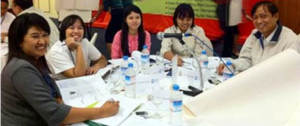
I am back to Singapore after a workshop trip from Yangon. Great to be able to say Hello to you again after a few months break from writing. Time certainly flies admist all our busy schedules.
I spent 2 days conducting a workshop in Myanmar, an event jointly-organized by a Myanmar organiser and one of our local institutions. It was the FIRST workshop in Yangon to invite an overseas trainer for conducting a workshop on Branding. And I felt so honored to be part of the event. The workshop consisted of 22 Myanmar participants who were mostly brand managers, senior brand managers and c-level management.
It was beyond my expectations, being a very enriching experience with engaging participants. The workshop shared the importance of branding audit and how the road map and strategies of branding could help the local start-ups, existing and established companies to continue investing and engaging in branding activities to sustain their branding leadership.
The participants have demonstrated the training effectiveness for sharing the learning topics through experiential learning methods such as the case methods, workplace case simulations, discussion and presentation.
But most of all, my point of sharing with you is about the feedback techniques adopted by participants throughout the entire workshop. We applied real workplace cases to integrate our learning and the cases saw gaps being assessed and feedback on by the participants. Many times, the negative feedbacks were well-received and the participants remained in good spirits.
It was so natural for the participants to express themselves in positive tones complemented with body languages, such that you could feel they were sincerely helping each other to improve, and not to make a personal judgment, attack or belittle the ideas that have been presented. I saw how thegreat feedback techniques were used by Myanmar participants in an environment of trust. These are my observations:
 |
|
In many of my workshops, I have stressed on the important of feedback – be it sales and marketing, customer services, communication, and general management – for personal and organizational development. The responses of listening, respecting and politeness are all seemed so ordinary for the Myanmar participants. Yet these are the simple acts of human kindness embrace in the feedback techniques that make the workshop a pleasant environment to work with.
Last but not least, I was happy to learn that being a TEACHER is a respectable and honourable job in the Myanmar culture. And yes, it was certainly felt different to see men – the hunk – wearing Longyis in the class. This workshop has certainly left a deep impression on me.
Cecilia Sim, Strategy Training Partner

